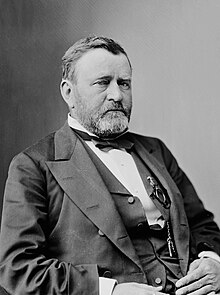| ||
|---|---|---|
American Civil War
18th President of the United States
Presidential elections
Post-presidency
 |
||
Ulysses S. Grant (born Hiram Ulysses Grant; April 27, 1822 – July 23, 1885) was the 18th president of the United States, serving from 1869 to 1877. As president, Grant was an effective civil rights executive who worked with the Radical Republicans during Reconstruction to protect African Americans, created the Justice Department, and reestablish the public credit. Promoted lieutenant-general, in 1864, Grant led the Union Army in winning the American Civil War in 1865, thereafter he served as Commanding General.
Raised in Ohio, young Grant possessed an exceptional ability with horses, which served him well through his military career. He was admitted to West Point and graduated 21st in the class of 1843. Grant served with distinction in the Mexican–American War. In 1848, he married Julia Dent, and together they had four children. Grant abruptly resigned his army commission in 1854 and returned to his family, but lived in poverty for seven years. During the Civil War, Grant joined the Union Army in 1861. Grant led the Vicksburg campaign, in 1863, which gained control of the Mississippi River. After Grant's victory at Chattanooga, President Abraham Lincoln promoted him to Lieutenant General. For thirteen months, Grant fought Robert E. Lee during the high-casualty Overland Campaign and at Petersburg. On April 9, 1865, Lee surrendered to Grant at Appomattox. A week later, Lincoln was assassinated and was succeeded by President Andrew Johnson, who promoted Grant to General of the Army in 1866. Later Grant openly broke with Johnson over Reconstruction policies; Grant used the Reconstruction Acts, which had been passed over Johnson's veto, to enforce civil rights for recently freed African Americans.
A war hero, drawn in by his duty to serve office, Grant was unanimously nominated by the Republican Party and was elected president in 1868. As president, Grant stabilized the post-war national economy, created the Department of Justice, and crushed the Ku Klux Klan. He appointed African Americans and Jewish Americans to prominent federal offices. In 1871, to help reduce federal patronage, Grant created the first Civil Service Commission. The Liberal Republicans and Democrats united behind Grant's opponent in the presidential election of 1872, but Grant was handily re-elected. Grant's Native American policy was to assimilate Indians into the White culture; the Great Sioux War was fought during his term. In Grant's foreign policy, the Alabama claims against Great Britain was peacefully resolved, but his prized Caribbean Dominican Republic annexation was rejected by the Senate. Grant's responses to federal corruption charges were mixed, at times defending culprits, but Grant also appointed cabinet reformers, for example, for the prosecution of the Whiskey Ring. The Panic of 1873 plunged the nation into a severe economic depression that allowed the Democrats to win the House majority. In the intensely disputed presidential election of 1876, Grant facilitated the approval by Congress of a peaceful compromise.
In his retirement, Grant was the first president to circumnavigate the world on his tour, meeting with many foreign leaders. In 1880, Grant was unsuccessful in obtaining the Republican presidential nomination for a third term. In the final year of his life, facing severe financial reversals and dying of throat cancer, he wrote his memoirs, which proved to be a major critical and financial success. At the time of his death, he was memorialized as a symbol of national unity. Militarily evaluated, Grant was a modern general and "a skillful leader who had a natural grasp of tactics and strategy." Historical assessments of Grant's presidency have improved over time. Grant was ranked 38th in 1994 and 1996 but ranked 21st in 2018. Although critical of scandals and Grant's loyal defense of culprits, modern historians have emphasized Grant's two-term presidential accomplishments. These included Grant's protection of African American civil rights, prosecution of the Klan, innovative Native American policy, and the settlement of the Alabama claims.
Last Updated: June 9, 2021
























